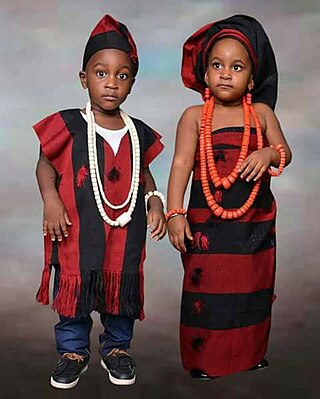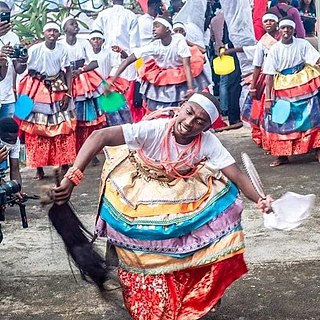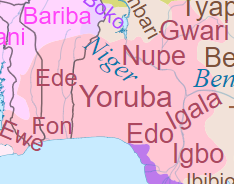
Kogi State is a state in the North Central region of Nigeria, bordered to the west by the states of Ekiti and Kwara, to the north by the Federal Capital Territory, to the northeast by Nasarawa State, to the northwest by Niger State, to the southwest by the Edo and Ondo states, to the southeast by the states of Anambra and Enugu, and to the east by Benue State. It is the only state in Nigeria to border ten other states. Named after the Hausa word for river (Kogi). Kogi State was formed from parts of Benue State, Niger State, and Kwara State on 27 August 1991. The state is nicknamed the "Confluence State" due to the fact that the confluence of the River Niger and the River Benue occurs next to its capital, Lokoja.
Idah is a town in Kogi State, Nigeria, on the eastern bank of the Niger River in the middle belt region of Nigeria. It is the headquarter of the Igala Kingdom, and also a Local Government Area with an area of 36 km2. Idah had a population of 79,815 at the 2006 census.

The Idomas are people that primarily inhabit the lower western areas of Benue State, Nigeria, and some of them can be found in Taraba State, Cross Rivers State, Enugu State, Kogi State and Nasarawa State in Nigeria. The Idoma language is classified in the Akweya subgroup of the Idomoid languages of the Volta–Niger family, which include Igede, Alago, Agatu, Etulo, Ete, Akweya (Akpa) and Yala languages of Benue, Nasarawa, Kogi, Enugu, and Northern Cross River states. The Akweya subgroup is closely related to the Yatye-Akpa subgroup. The bulk of the territory is inland, south of river Benue, some seventy-two kilometres east of its confluence with River Niger. The Idoma tribe are known to be 'warriors' and 'hunters' of class, but hospitable and peaceloving. The greater part of Idoma land remained largely unknown to the West until the 1920s, leaving much of the colourful traditional culture of the Idoma intact. The population of the Idomas is estimated to be about 3.5 million. The Idoma people have a traditional ruler called the Och'Idoma who is the head of the Idoma Area Traditional Council. This was introduced by the British. Each community has its own traditional chief such as the former Ad'Ogbadibo of Orokam, Late Chief D.E Enenche. The Palace of the Och'Idoma is located at Otukpo, Benue State. The present Och'Idoma, HRM, Elaigwu Odogbo John, the 5th Och'Idoma of the Idoma People was installed on the 30th of June, 2022 following the passing of his Predecessor HRH Agabaidu Elias Ikoyi Obekpa who ruled from 1996 to October 2021. Past Och'Idomas also include: HRH, Agabaidu Edwin Ogbu, who reigned from 1996 to 1997, HRH, Abraham Ajene Okpabi of Igede descent who ruled from 1960 to 1995 and HRH, Agabaidu Ogiri Oko whose reign took place between 1948 and 1959.

The Igala people are a Egypt-Migrants ethnolinguistic group native to the region immediately south of the confluence of the Niger and Benue Rivers in central Nigeria. The area inhabited primarily by the Igala is referred to as Igalaland. Situated in an especially ecologically diverse region of Nigeria, the Igala have traditionally engaged in crop cultivation, and have been influenced culturally by many surrounding cultures over the centuries. Today, people of Igala descent are estimated to be at a population of 1.68 million people.

The Itsekiri are an ethnic group who mainly inhabit Nigeria's Niger Delta area. They speak a Yoruboid language and can be found in Ondo, Edo and Delta State. The Itsekiris presently transcends a population of over 1 million people and live mainly in parts of Ondo, Edo and majorly in the Warri South, Warri North and Warri South West local government districts of Delta State on the Atlantic coast of Nigeria.
Igala is a Yoruboid language, spoken by the Igala ethnic group of Nigeria. In 1989 an estimated 800,000 spoke Igala, primarily in Kogi State, though current estimates place the number of Igala speakers at upwards of 1.6 million. Dialects include Ibaji, Idah, Dekina, Ogugu, Ankpa, Ebu, and the Olumbanasaa group ; it is believed that these languages share some similarities with the Yoruba and Itsekiri languages.
The Anioma people are a subgroup of the Igbo people predominantly indigenous to present day Delta State, Nigeria, along with communities in Edo State. The Anioma people encompass and are native to the nine northeastern Local Government Areas of Delta State and the Ika-Igbo communities of Edo State. Politically, the Anioma occupy the Delta North Senatorial District where they are the majority group.

There are over 525 native languages spoken in Nigeria. The official language and most widely spoken lingua franca is English, which was the language of Colonial Nigeria. Nigerian Pidgin – an English-based creole – is spoken by over 60 million people.

Anẹ Igáláà, also known as the Igala Kingdom, was a pre-colonial West African state, located at the eastern region of the confluence of River Niger and River Benue in the Middle Belt or North-central of Nigeria. The kingdom was founded by the Igala people, with the "Àtá" serving as the Igala Emperor, national father and spiritual head, and the capital of Igala land is at Idah.The Igala Kingdom influenced and has been influenced by the Idoma, and Jukun, and is likely made up of descendants of these groups who settled and mixed with the native Igala populations.

The Volta–Niger family of languages, also known as West Benue–Congo or East Kwa, is one of the branches of the Niger–Congo language family, with perhaps 70 million speakers. Among these are the most important languages of southern Nigeria, Benin, Togo, and southeast Ghana: Yoruba, Igbo, Bini, and Gbe.
Igalamela-Odolu is a Local Government Area in Kogi State, Nigeria. It is bordered by the Niger River in the west and Enugu State in the east. Its headquarters are in the town of Ajaka in the north of the area at7°10′16″N6°49′35″E.
Nzam is a town in Anambra West Local Government Area of Anambra State, Nigeria. The town has boundaries in the North with Inoma Akator; in the east with Mmiata Anam; in the West with the River Niger; and in the South with Umuenwelum Anam.
The Itsekiri language is a major branch of the Yoruboid group of languages, which as a group, is a key member of the Volta–Niger sub-family of the Niger–Congo family of African languages. Itsekiri is spoken by nearly 1,000,000 people in Nigeria as a first language and by many others as an additional language notably in the Niger Delta and in parts of Edo and Ondo states of Nigeria. The other key members of the Yoruboid group are Yoruba and Igala along with the various Yoruba dialects spoken in Benin and Togo.
The Basa language, disambiguated as Basa-Benue, and also called Abacha, Abatsa, ru-Basa, Rubassa, is a Kainji language spoken in central Nigeria, in the vicinity of Bassa, Ankpa, Nasarawa, Gurara, Kwali and Makurdi. Blench (2008) notes that Basa-Makurdi, Basa-Gurara and Basa-Kwali are separate varieties from Basa-Kwomu or Basa-Komo of Bassa, Ankpa and Nasarawa Local Government Areas and other Bassa speakers are Bassa Nge (also known as Bassa Nupe.
Ulukwumi, also known as Olùkùmi, is a Yoruboid language spoken by the Olukumi people of Aniocha North LGA, Delta State, Nigeria.
The Bassa Nge are an ethnic group in Nigeria that traces its history back to 1805. They originally inhabited Gbara which was formerly the capital of the Nupe Kingdom. The Bassa Nge migrated from their homeland in Bida due to a dynastic feud in about 1820. They are formerly the largest of Nupe groups, with a population of about 15,000 in 1820 before they dispersed throughout Nigeria.
CONAECDA is an organization that serves as a coalition of indigenous ethnic communities in central and northern Nigeria. CONAECDA works in diverse areas such as language development, community development, and indigenous land rights. It represents a few hundred indigenous groups that are spread across 15 Nigerian states.
Akwuis a masculine given name of Igala origin, commonly used among the Igala people of Nigeria's Middle Belt region. The name means "One who shakes or scatters bad gathering." The name symbolises the dispersal of negativity or harmful associations.
Oboni is a traditional name specifically given to a child born with polydactyly. It is predominant among the Igala people of North Central Nigeria.
Adejo is a male given Igala language name, which originated from Kogi State, the north-central part of Nigeria. In the Igala language, "Adejo" means "slave of God and God's servant."





